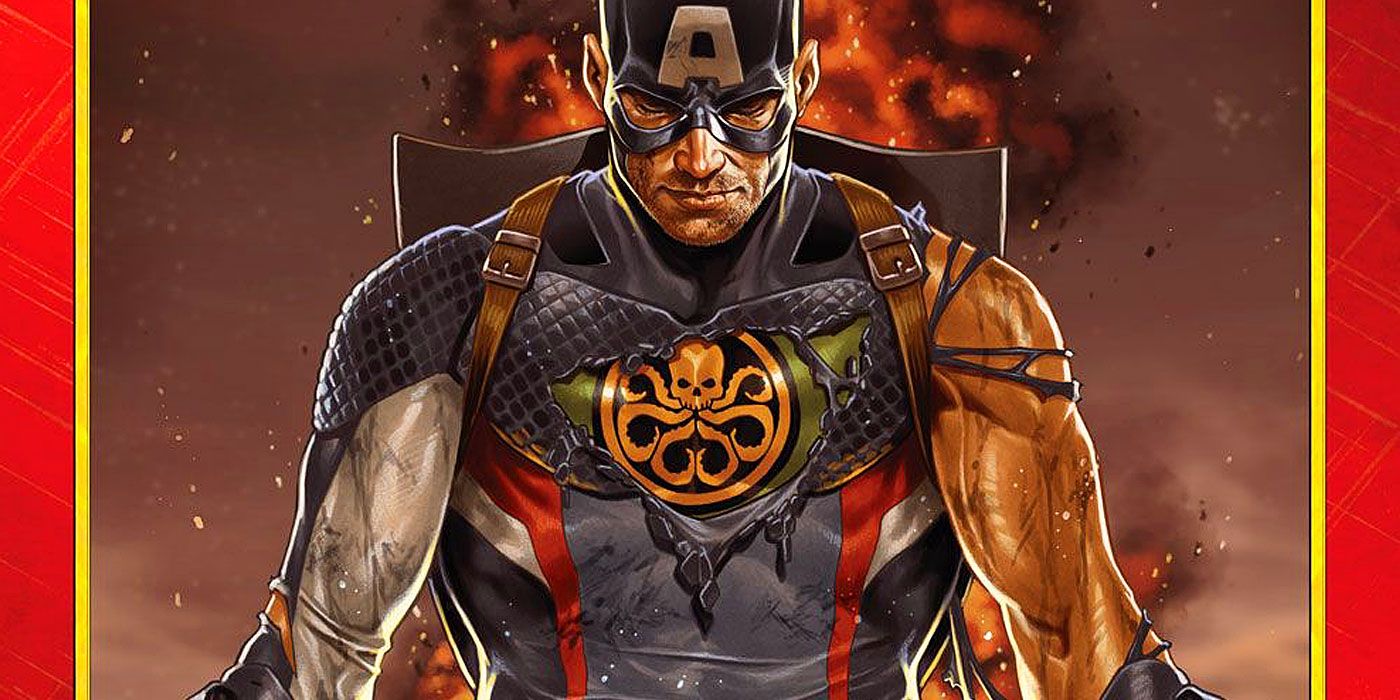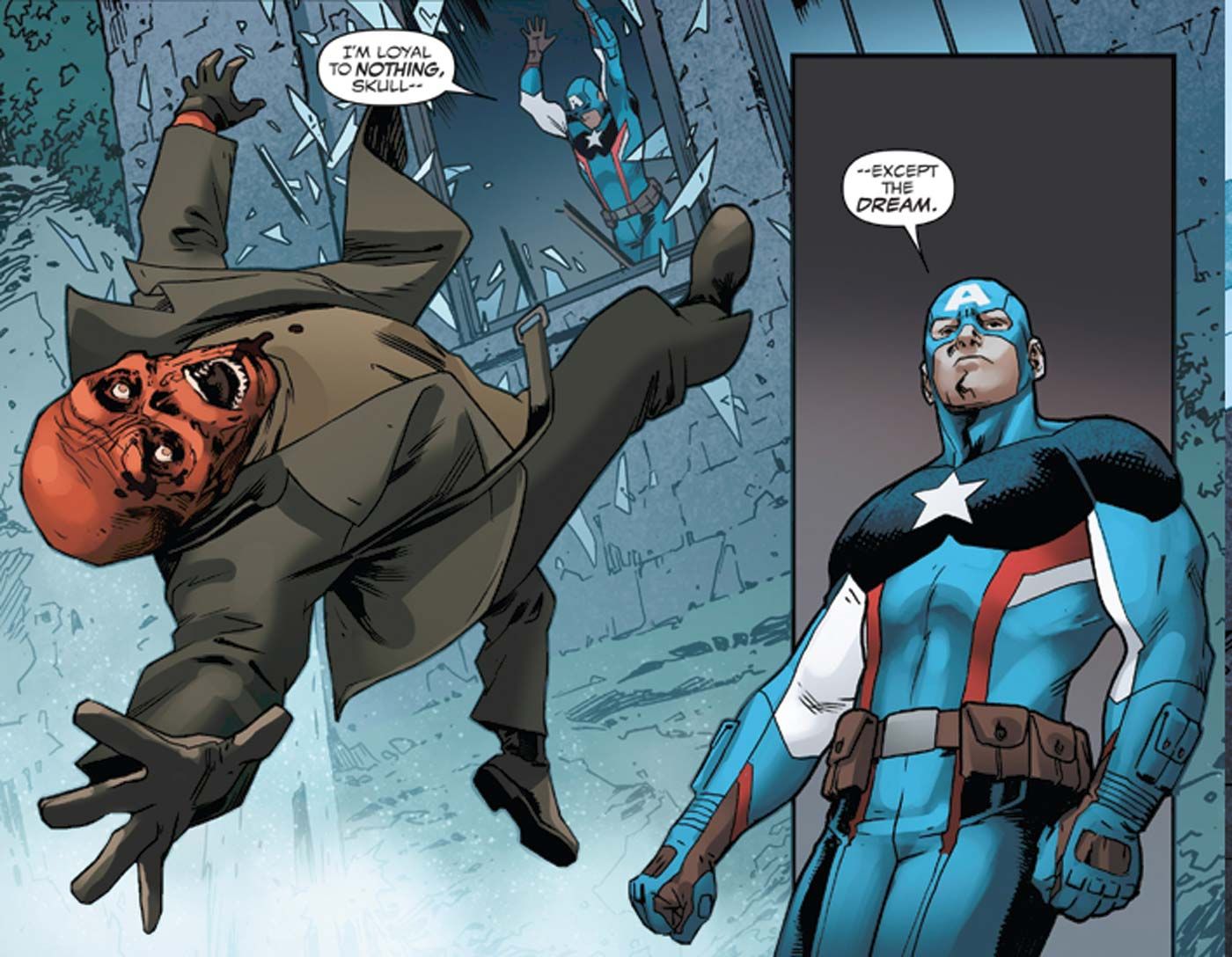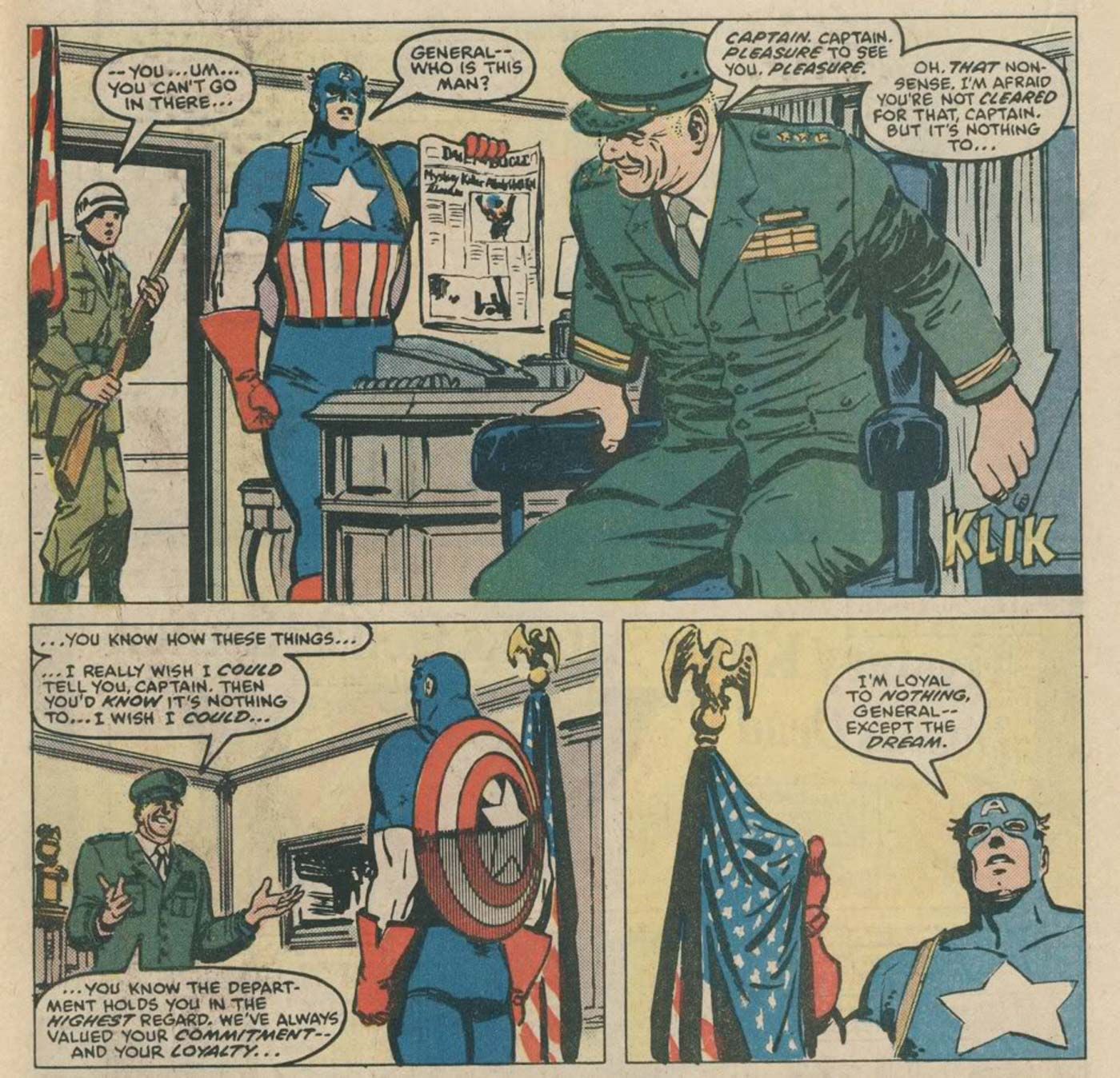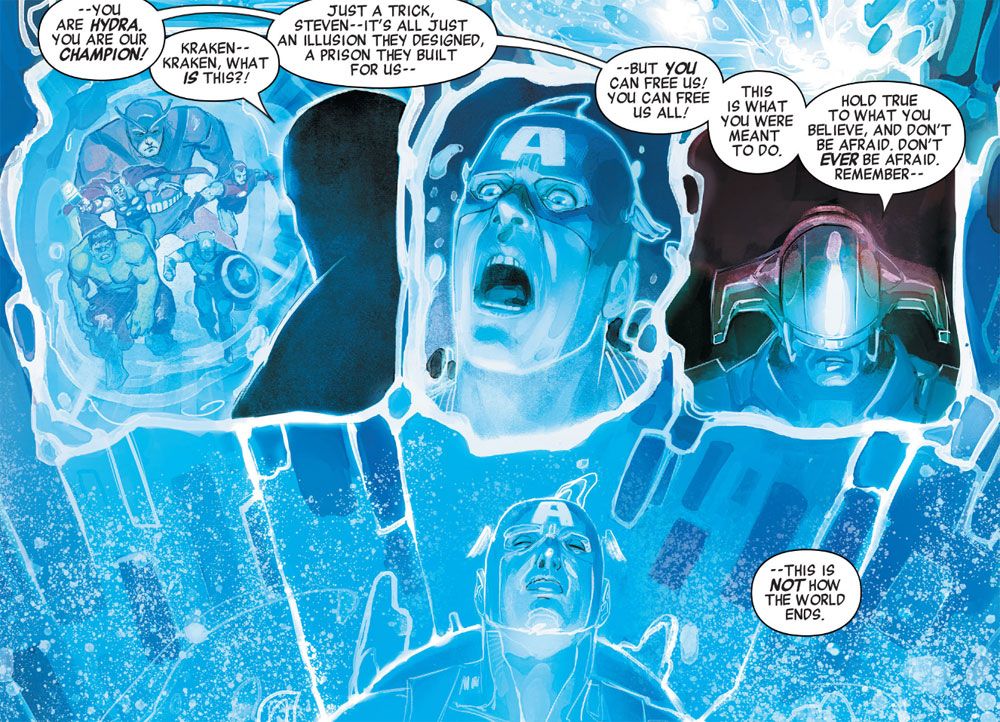When Steve Rogers sent the Red Skull hurtling to his death in the pages of “Captain America: Steve Rogers” #15, the Avenger yelled after his nemesis, “I am loyal to nothing, Skull… Except the dream.” He shouted this, as if affirming to himself his actions were justified, just after the helpless villain revealed that he had altered the Captain’s past, that Rogers' life was all a fantasy. It wasn’t the first time Cap had uttered these words, however; he first spoke them in the pages of 1986’s “Daredevil” #233, the final issue of Frank Miller and David Mazzuchelli’s legendary run on the title, which just so happened to be dedicated to Captain America co-creator, Jack Kirby.
In that issue, Rogers spat the words at a corrupt general who tried to appeal to Steve’s loyalty to the U.S. Army as a way of keeping the Captain from investigating the resurrection of the Super Soldier program, and from discovering an alliance he’d formed with the Kingpin to wreak havoc in Hell’s Kitchen, thus causing people to flee, and in the process driving down real estate prices. Rogers not only foiled the Kingpin’s plan, he also rescued the traumatized Super Soldier -- codenamed Nuke -- who was being held prisoner and had been made a pawn in the scheme.
Miller’s story showed Captain America at his best, a principled soldier who recognized that serving his country and doing the right thing were not about blindly following orders, but about getting to the truth. Nick Spencer’s Captain America is driven by the same need to serve the common good and to do the right thing, but his truth, his moral compass, has been altered. He is now, and has always been an agent of Hydra, the very organization that he has fought since since World War II.
But although his reality and his personal history have changed, Steve’s core qualities are very much intact. The Super-Soldier Serum has given him physical and cognitive abilities at the upper limit of human potential, while his years of a battle as a member of the U.S. Military, as the leader of the Avengers, and as a S.H.I.E.L.D. operative have crafted him into a master tactician. But his true strength is his code of ethics. Steve Rogers has never been shy about standing up for his beliefs, going so far as to walk away from the title and the shield when at odds with his leaders.
In stepping down as Captain America in the 1970s because he could no longer serve the government in good conscience, he adopted the monicker Nomad, signifying he was a man with no country. Steve Rogers’ uniform may be red, white and blue, but he sees the world in black and white, right and wrong. And this is why the very qualities that make him Marvel’s greatest hero have made him its greatest villain.
Heroism -- or at least the desire to serve a greater cause -- is built into Rogers’ DNA. He remains the 98-pound weakling who wants to take down the heavyweights. He remains the working class kid who wants to take on the world’s oppressors. The Super-Soldier Serum is merely the vector that allows him to fulfill his destiny. It is this inherent greatness that General Phillips recognized when he recruited Rogers into Project: Rebirth, thus transforming him into the man who would become Captain America.
It is the same greatness that Elisa Sinclair seized upon when she first encountered the six year-old Steve at the side of his abused mother in 1929. Upon inviting Sarah Rogers to join a version of Hydra that presented itself as a civic group combatting societal ills, Sinclair informed the battered young textile mill worker that her son would grow up to do great things. As this version of Steve Rogers’ life unspooled, we learned that one of these great things would be assuming the leadership of Hydra.
In “Secret Empire” #0, we are shown a version of history in which Hydra won World War II. This is not the ancient mystical order that recruited Steve, but the fascist organization that had arisen under the Red Skull after Sinclair had made a pact with him to ensure its survival. But this victory was short lived, as the Allies had developed the reality-altering Cosmic Cube and were about to use it to rewrite history, thus making them the winners.
To fight the Allies meddling with the timeline, Sinclair’s version of Hydra decided to freeze Rogers, thus suspending him in time, to be awakened at a later date. He was warned that he’d awake in the midst of a life he’d never lived, and that Kobik, a sentient version of the same Cosmic Cube that created the alternate future, would restore his true past, thus revealing his true destiny as the champion of Hydra. The terrified Steven, ever mindful of his duty, accepted the mission, and stepped into the freezing waters of a mystical Arctic pool to await his future.
In the present day, Rogers is a man of two worlds. He uses the combined knowledge of his two histories to go to war with the heroes of the Marvel Universe, but he is not an outsider looking in. Rather, he is the ultimate insider, intimately connected to the people and powers whom he seeks to overthrow. He uses his iconic status as a paragon of virtue to amass tremendous personal power -- this is what makes him the ultimate villain.
As he betrays one after another of his longtime friends and confederates, he reveals the magnitude of his scheme. Under the pretence of uniting his allies under his leadership, he has engineered a series of events that has divided them, trapping them in New York City, Bagalia, Sokovia and in orbit, miles above Earth. Rogers uses their trust and his intimate knowledge of their systems and tactics to subvert them. Marvel’s heroes and the mighty S.H.I.E.L.D. succumb to his master plan, but they are not his only target.
As Rogers takes out the forces of good, he also takes over the forces of evil. Disguising himself by electronically scrambling his televised image, he seizes the reins of the Red Skull’s version of Hydra. But rather than spewing the hateful rhetoric of his enemy, he offers salvation to the Skull’s footsoldiers. “We will fight to forge a better world,” he tells the Skull’s henchmen, “A world where no one is put above any other -- where all work together for a common cause -- ever expanding... ever increasing.” Yet, his promise of order comes at the price of violence.
Ever the charismatic leader, Rogers demands and earns immediate allegiance. The same man who tried to stop Hydra suicide bomber Robbie Dean Tomlin from killing himself up in “Captain America: Steve Rogers” #1 orders Hydra operative James Reed to blow himself up in the sixteenth issue of the same title. This mirror inversion, like the one Spencer crafted around Miller's classic scene, demonstrates how the very qualities that make him a hero and a paragon under one light transform him into a villain and a zealot when his perspective shifts.
Steve Rogers the villain, like Steve Rogers the hero, believes he has right on his side, and is thus able to convince others to follow him. This is what makes him so dangerous, more than his superhuman abilities, more than his history as an Avenger. The purity of his intent makes him the ultimate adversary, no matter which side he’s on. With "Secret Empire" just beginning, we can only speculate where his steadfastness may lead him. After all, it is the victors who get to write history and inform future generations of who the good guys are.




